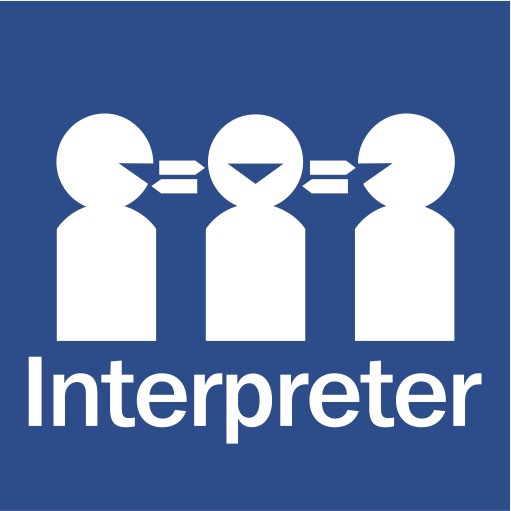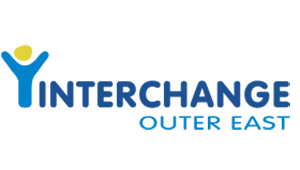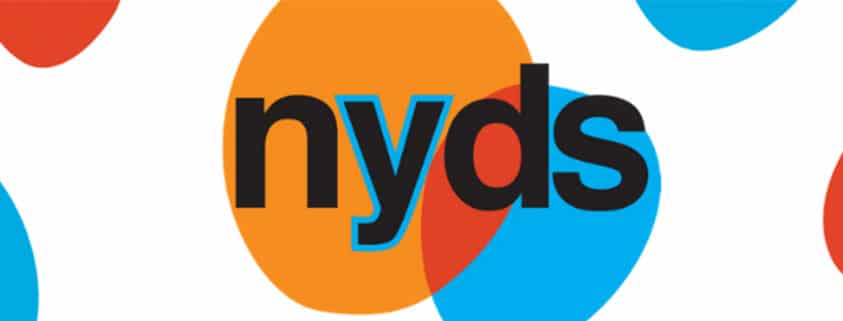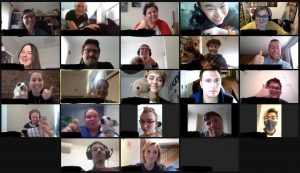NATIONAL YOUTH DISABILITY SUMMIT
Hi everyone! My name is Angie, and I use she/her or they/them pronouns. I would like to acknowledge that I am currently on the traditional land of the Wurundjeri People of the Kulin Nation, and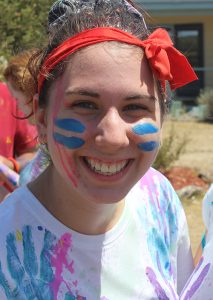 I pay my respects to Elders past, present and emerging. Sovereignty has never been ceded and this always has and always will be Aboriginal land. A visual description of myself; I am Caucasian, with short brown hair which is half up/half down, and you can see my red scrunchie. I am wearing a black singlet and I am sitting in front of a brick wall. You might see some fairy lights behind me.
I pay my respects to Elders past, present and emerging. Sovereignty has never been ceded and this always has and always will be Aboriginal land. A visual description of myself; I am Caucasian, with short brown hair which is half up/half down, and you can see my red scrunchie. I am wearing a black singlet and I am sitting in front of a brick wall. You might see some fairy lights behind me.
Today I will be talking about the two identities that make me, me; which is that I am gay and disabled. My story also has some content and trigger warnings for self harm and bullying. I will let you know when this is, I’ll put my hand up, and wait a few seconds. During this time, you may choose to silence your computer or even step away. When I am finished, I will put my hand down.
We will also put the number of the free helpline of the counsellors we are using. They know this conference is on, and if at any point you feel like you need to chat to someone, they will be there. We also have our fantastic Auslan interpreters with us, as well as our live captioning team.
Imagine if every introduction started like this.
Acknowledgement of land. Stating pronouns, content and trigger warnings and reminding you where you can reach out for help. As well as live captioning and Auslan services. This is what the vibe of the first National Youth Disability Summit was. A disabled led initiative by young people for young people, it was created to help bring young disabled people around Australia together. It made sure to accommodate all access needs, so everyone could attend without barriers. My biggest praise? It made sure to include my biggest project I am currently working on, to make sure that all events in the future are inclusive of both disabled/autistic and LGBTQIA+ needs. And NYDS did that so perfectly, I had never felt so at home.
Day One
Day 1 started off with a plenary, where we had Wurundjeri Council perform the Welcome to Country. MC’ed by Srishti Chatterjee, we heard from Issy Orosz, Chloe Hayden (Princess Aspien) & Hayden Moon. Focused on Education, and what inclusive education looks like for everyone, we travelled through the day navigating Zoom and breakout rooms. We did workshops surrounding the topic of inclusive education, and people shared their stories. These ranged from the lack of education around disabilities in primary schools and the bulling that results from this misunderstanding, to accommodations and modifications needed throughout high school into tertiary education. We learnt that the majority of individuals want to be listened to, and have assistance with the accommodations they need; too often they were left to do it alone and it was a draining process.
Day Two
Day 2 kickstarted off with another plenary, this time MC’ed by Elise Muller. We heard from a range of disabled voices, including Mali Hermans, Mathew Townsend and Brigid Canny. With Employment the theme for the day, a career fair the next activity, we could choose to virtuality chat to a number of organisations on different jobs, including ANZ, Australia Post, National Indigenous Australians Agency (NIAA) and Mable. The next two sessions were some of my favourites – identity and advocacy. We spoke about how we identified, and what events led us to understanding and accepting our identities. From there, we got to sit back and listen to a number of advocates in the disability field talk about what advocacy is for them and how we can be our own advocates!
Day Three
Day 3 once again started off with a plenary, MC’ed by Amy Marks, with guest speakers for the morning Mel Tran, Mary Sayers, Annika, Damian Griffis & Jax Jacki Brown on the disability rights movement and how we can continue to raise awareness for access and inclusion. The biggest day, welcoming those over the age of 30 to listen to us, we entered into our day of Awareness, Access and Inclusion and went into a structured networking session on advocacy.
We shared what advocacy was for us and how we can enable others to advocate for themselves. Communication is a fundamental part of learning to self-advocate. It is important to speak out to trusted people when you have an issue, but also to have those individuals start the conversation and to make sure they check in. We also identified that sometimes it can be hard to speak up, but to remember it’s okay to voice that something is not okay. We then went onto a Youth Power Panel. This session was facilitated by Mel Tran, with Timothy Lachlan, Natasha Swingler and Matt O’Neil. It is so amazing to hear from young disabled people with lived experience around advocacy!
The highlight of the day was definitely The Talking Truth to Power workshop, with international guest speakers; the directors of Crip Camp, making an appearance first up. We then moved into break out rooms and I was lucky enough to have a member of parliament in my group. They listened actively on the inaccessibilities of the education system, buildings and transport. I contributed my big piece of making sure disabled and LGBTQIA+ events are inclusive of each others needs; quiet spaces and sensory considerations, as well as using gender neutral terms and respecting pronouns. The member of parliament asked how government could address this and how they could continue to include disabled voices in important matters.
That evening, we had a Ted-like talk – LiveX, and heard from six of the co-founding members, Tim L, Tim C, Allycia, Poppy and Kochava. So much to take in, and what an AMAZING end to the day!
Day Four
Day 4 started off with jumping straight onto Zoom, with an Ideas and Experiences session. We talked about what makes us happy, how we access supports and also the barriers we face, to give feedback for the next National Disability Strategy. After a little break, we went onto hear from Robyn Lambird, Layne Dixon and Andre Ascu. They shared about their involvement with sport and representing Australia, how they access it and how the NDIS has helped them. We then went onto a plenary talk with Senator Jordon Steele-John, Jocelyn Nuemuller and Jesse Williams. They spoke about the NDIS and housing.
That evening, we did another great structured networking session on Disability Pride. In small groups, we spoke about how we were proud of our disability. For me, my disability gives me a unique perspective of the world. It has allowed me an amazing skillset to work in the disability field and special interests to pursue careers that I am passionate in! We also shared disabled people in our life we looked up. This gave us a great list of new people to follow on social media!
Day Five
Day 5 started off with our last plenary. We heard from Annika Victoria, Elise Muller and Jess from (Deafferent Theatre) about mental health and their journey through it. After a short break, we had a Workshop led by Jess on Active Listening and Safe Storytelling. Jess spoke about how to tell our story, but also how to let others know when you can’t listen to their story; if you’re not in the right headspace it’s okay to say no to look after yourself. It was then onto a workshop from Activate Agency in Auckland. Kera Sherwood-O’Regan and Jason Boberg spoke about social change and how to remove ableism from society. We touched on tokenism and using disabled people in marketing, inaccessible environments and in social movements where activism doesn’t consider disabled people’s involvement.
Why did it take a pandemic to move online and make everything accessible to disabled people who were not previously able to attend events? And how can we make sure this continues post COVID? We also spoke about ways to reduce ableism, including planning ahead and using funding on improving accessibility, e.g. Auslan interpreting. We then went into a workshop on sexual health. The session was beneficial to many who have never received a proper sex education class. It was then onto our final Ideas and Experiences workshop, talking about Choice and Wellbeing, and the barriers we used and what would help us.
The resounding theme was – listen to the person who needs the support about what they want and need; not what you think they need. This was a powerful way to finish up the Summit, as well as reflecting over the past five days.
This is only the beginning for the young people who attended. We are excited to see what the future brings!
– By Angie Sipka, IOE Support Worker and Volunteer
